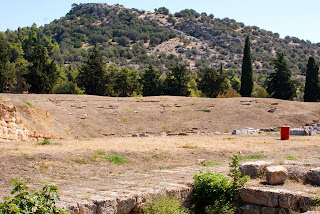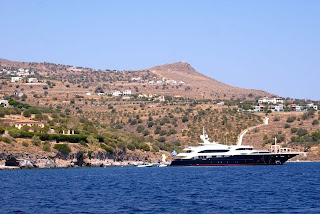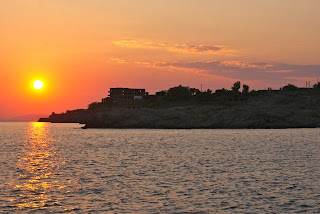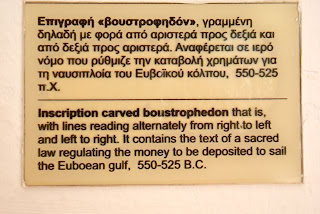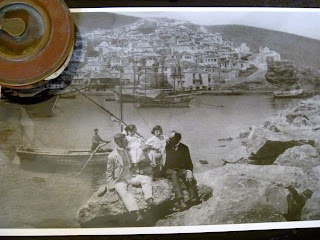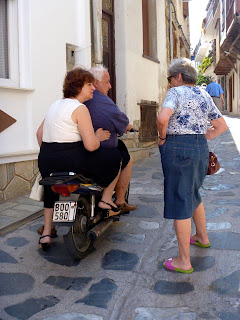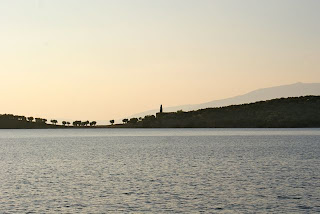 |
| Dusk in the gulf of Volos, looking towards the Pelion range |
One of the few things I am indisputably better at than Alex is typing. It's a small matter but hey, sometimes it's useful. Touch typing makes thinking on a keyboard faster, but as a baseline you need 10 operational fingers.
Right now I have nine. One is out of play for a few weeks, sidelined by a bloody close encounter with 10mm galvanised steel anchor chain. You don't need to know more. Sympathy declined. It's a basic boating rule that even - or especially - in a tricky situation (which this was, in the infamously unreadable approach to the Khalkis bridge over the Evia channel), you keep your hands clear of the anchor and/or chain. I accept the blame and pain.
But we are in Greece where, prompted by the deeply suggestive Greek geography and language, snatches of remembered myth about the crowd on Mt Olympus float readily to the surface of the mind, and I often find myself wondering if the various plot twists in Enki's summer two-hander are providing sufficient amusement for the gods... yet.
I am sitting with my right hand resting above my heart (thanks to the back-up medical team on
Sea Cloud for their advice), and typing with one finger. Alex is now in charge of everything requiring two hands and contact with water. Surprisingly, that does leave a few things for me to do on the boat - I can still lower and raise the anchor with the foot-operated deck button, for example. Now I sense your confusion. So why did she need to have her hand near....as I said, no need to know too much. We have had a few problems this season with the fabulous new bow roller, and we will get it modified over the winter. Alex's back agrees.
 |
| Kkalkis bridge, looking from the north side |
Perhaps there should be a teeshirt: I PASSED THROUGH KHALKIS. On paper the Evia Channel looks a doddle, the obvious route north or south in the summer when the prevailing
meltemi wind is blowing dogs off chains (how many times have I heard that lately, and each time it makes me smile). The first I heard of the Khalkis bridge, which crosses the channel at the town of that name, was in Thasos, from a woman on a Swiss boat which was heading the same way. She said the bridge would be an "adventure". That was news to me.
 |
| Evia island. from the channel north of Khalkis |
I'd wanted to go south via the Evia channel because I've been reading a book on and off for a year or more called
Travelling Heroes, byBritish historian Robin Lane Fox. It's a bit dense, but the heroes in question are Greeks who lived on Evia in the 8th century BC and took their culture and gods as far west as Italy and as far east as Lebanon (using the modern names for these places). The two most important city-states of the seven on Evia were Khalkis and Eretria. I wanted to at least pass by these towns, knowing they were well beyond their prime, but still, the waterway and the mountains don't change over two or three millenia, do they?
 |
| Fishing village in O. Vathoudhi, gulf of Volos |
 |
| Lighthouse on Aryironisis in the Trikeri channel |
From Skopelos we headed west towards the gulf of Volos, and parked ourselves for a couple of days beneath the beautiful wooded slopes of the Trikeri peninsula. How strange it is to be sizing up an anchorage on the basis of depths and wind direction and to learn from the cruising guide that such and such a place which you have just decided to leave in your wake was where Achilles supposedly launched his fleet to set out for Troy ("the wind is blowing straight in from the south east, it may die, but there's better shelter a bit further on and we have time..."- so goes our standard pre-anchoring blether, with Achilles counting for nothing in this instance).
The gulf of Volos sits to the north of Evia, so we followed the wind down pretty much, and the sailing has been amongst the best so far, with relatively flat water and fine strong breezes.
 |
| Lazy sailing with reefed genoa and 7 knots is plenty fast |
Then came Khalkis where we made a bit of hash of things, I ended up looking like a vampire, as Alex said, we were befriended by a big strong single-hander called Gene, originally from Odessa but now from Brooklyn, NYC, and yes, it was an adventure, that bridge.
 |
| Rafted up to Lariella, and Capt Gene, on the quay at Khalkis |
 |
| Freighter comes through open bridge from south |
In brief, it's a sliding bridge 25 m wide, crossing a gap only 39 m wide between the island of Evia and the mainland. It opens once every 24 hours, sometimes less often, always at night, and only when the tide is slack. It seems to be a black art judging slack tide at Khalkis. The currents in the channel are strong and at Khalkis they run up to 7 knots and change direction at will. There is no tide chart and nobody will tell you how deep the water is at the quayside because it changes all the time. To go through by boat, you must be in Khalkis in time to register and pay the toll before 9 pm and then you must find somewhere safe to anchor or tie up your boat until you are called to go through. There's hardly anywhere that fits the description safe for a boat with Enki's draft of 2.5 m; luckily we met Gene and rafted up to
Lariella. She was in 2.1 m at the quay but on her other side the depth was 3.5m, deep enough for us. The moon was full, and the water level dropped further, and bottomed at 3.2 m beneath
Enki. We were called by the port authority at 3 am, went through at 3.45 am and were anchored again in the big shallow bay on the south side by 4.15 am.
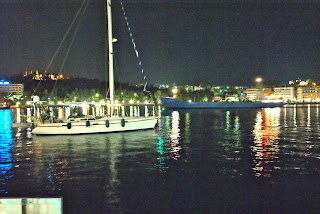 |
| Freighter goes south before us and yacht waits for quay berth |
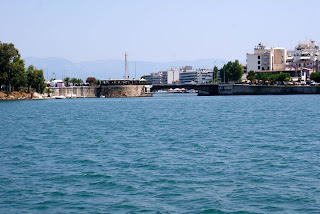 |
| The Khalkis bridge the next morning from the south anchorage |
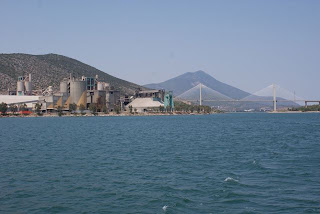 |
| The suspension bridge a little further south has air space galore |
Should you ever be in Khalkis in summer on a Saturday night, you should know that they party hard right on the quay. When we let off our lines, we could barely hear what Gene was saying to us from a metre away.
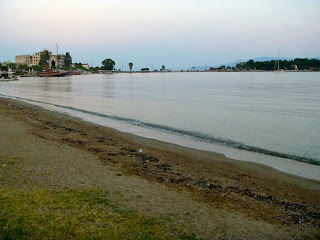 |
| Enki anchored off the beach in Eretria harbour |
Now we are anchored off Eretria inside the ancient harbour that the travelling heroes built. It is Monday, and tomorrow the museum will be open. Must be open! Last night we sat in a restaurant next to the car ferries which come in and out every 20 minutes. The octopus was very good. My finger was expertly dressed by the in-house pharmacist, and life was, is, not dull.





